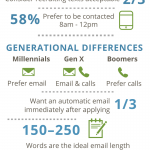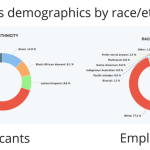Why The Next Person You Hire Should Be Overqualified
Hiring someone who is overqualified sounds like a recipe for disaster. What if they get bored and quit? Or what if they develop a bad attitude as a result of feeling above the duties of their job? Turns out you shouldn’t worry, according to new research published by the Academy of Management Journal. It found that hiring someone who is overqualified can be a win for both the employee and the employer.
“A major trend in our current economic condition is the rise in underemployment,” says Jing Zhou, a professor of management and psychology at the Jones Graduate School of Business at Rice University. “[Employers] almost universally believe it’s a bad thing to hire someone who is overqualified, but we found that there is another side to this with positive implications for management.”
Zhou performed two studies with Bilian Lin and Kenneth S. Law of the Chinese University of Hong Kong. In the first, teachers were asked to rank their qualification level on a scale of one to seven. The teachers’ supervisors were then asked to rate the teachers’ creativity and organizational citizenship. Those who rated themselves as overqualified for their position–a five on a scale of one to seven–also received the highest ratings from their supervisors.
In a second study, toy factory technicians were given a test that measured their qualification level. Participants were then given 30 minutes to design and assemble a toy boat, using at least 30 components. The workers identified as being modestly overqualified ended up using the most parts and creativity.
In both studies, Zhou and her colleagues found that overqualified workers employ “job crafting”: They play with new ideas and sequencing, and push the boundaries of their job. The teachers, for example, had taken the initiative to implement new approaches and organized special classroom events, while the toy factory technicians created unique designs or more than one toy boat.
“Overqualified workers tend to try different things, and through the process they bring creative insights and find better ways of doing their work,” says Zhou.
And this can be important to management for two reasons:
1. They get more done. Because they’re more qualified than the job requires, overqualified employees have underused capabilities and more time to engage in other activities. “They can complete their assigned tasks more quickly than those who are not underemployed,” says Zhou.
2. They go beyond the call of duty. The extra time is used in a way that helps the organization, says Zhou. “When a situation requires it or an opportunity appears, they step outside of their job description for the organization, generating new and useful ideas and doing more than they’re required,” she says.
Managing The Overqualified
To reap the benefits, managers need to be open-minded and willing to give the employee a chance, says Zhou. “Sometimes managers say, ‘You’re not focusing,’ or ‘You’re stepping outside of your boundaries,’” she says. “Instead, let [an overqualified employee] engage in job crafting and have confidence that over time, their efforts will result in creativity.”
Amplify the job-crafting motivation by helping employees to identify with the organization. “Practices that enhance organizational identification can increase job-crafting efforts for employees perceiving themselves as underemployed,” says Zhou. “If at any time an employee stops job crafting, or their job crafting does not lead to creativity, provide guidance to try to redirect effort into productive use of time.”
But don’t push someone into job crafting, Zhou adds. “It’s the employee’s choice to do it or not–but if they want to do it, they should have that freedom, with supervisors monitoring, coaching, and advising as needed,” she says.
One Caveat
While overqualified employees can be a benefit to their companies, someone who is extremely overqualified most likely won’t, cautions Zhou. “The organizational gain from underemployment is like drawing an inverted U, with the benefit to the employer increasing to a certain point, then falling,” she says. “In our research, the curve goes down as the employee’s drive gradually diminishes, and this is understandable. The job becomes so simple compared to their capabilities that they feel discouraged.”
(61)














